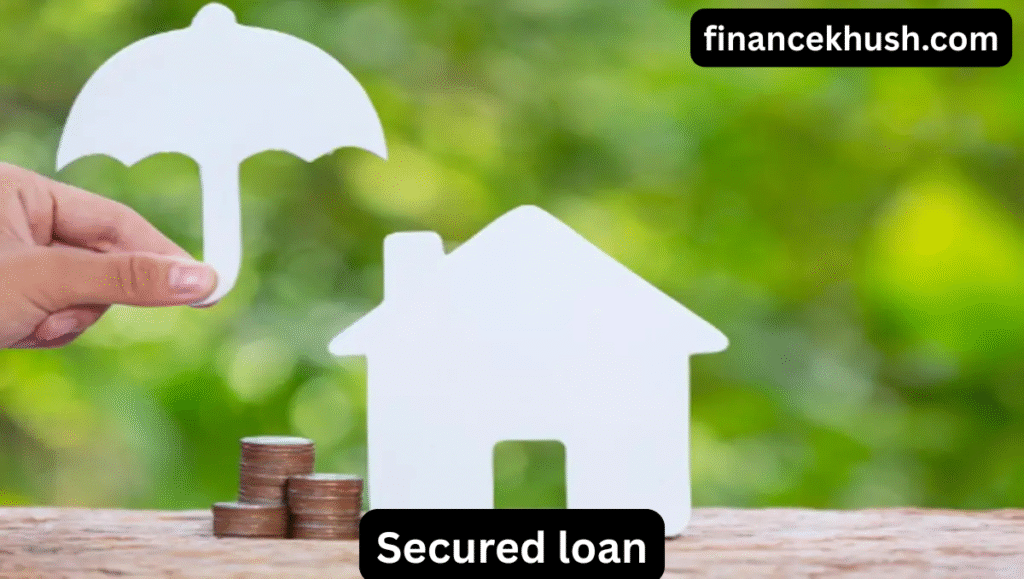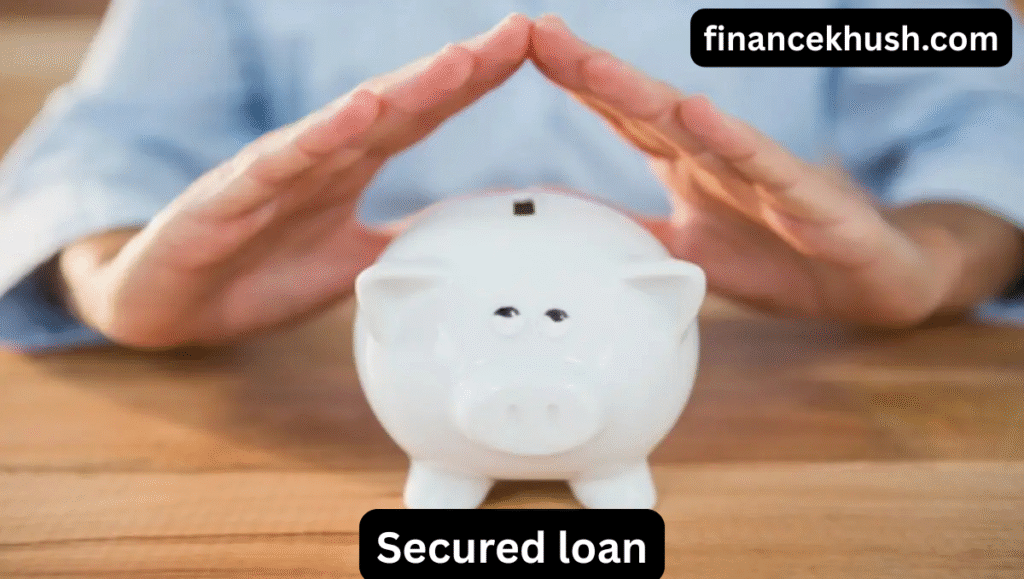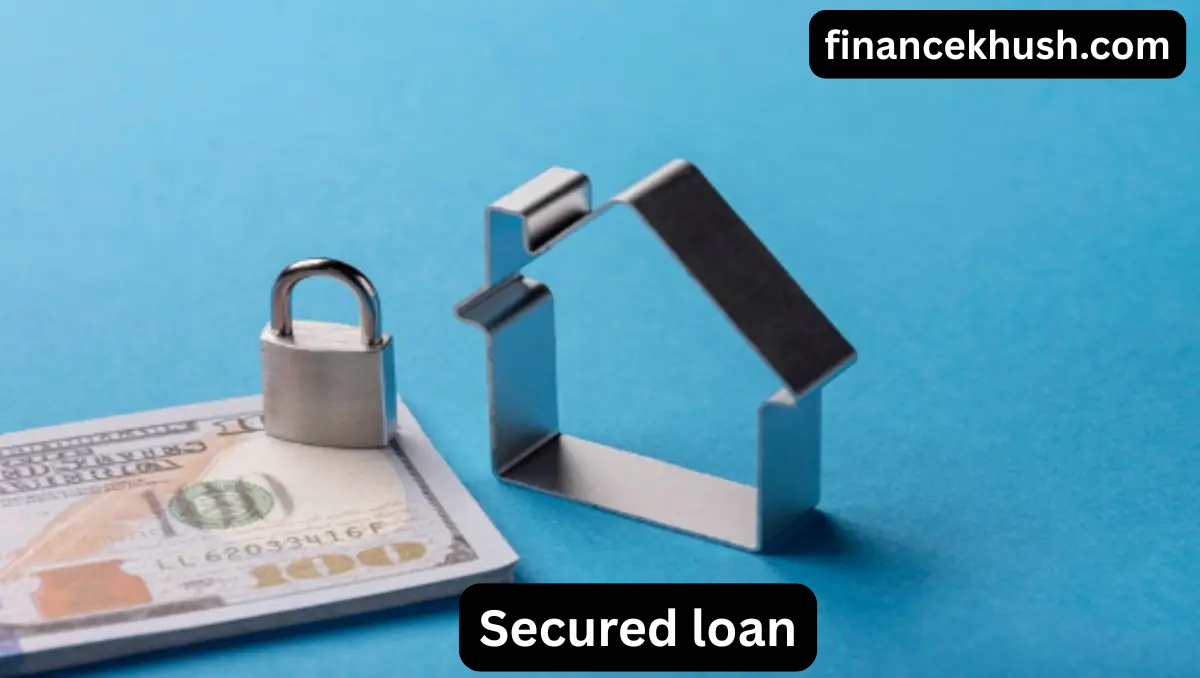Secured loan is a type of loan where you borrow money by offering an asset, like your home or car, as collateral. This reduces the lender’s risk, which means secured loan often come with lower interest rates compared to unsecured loan. If you fail to repay the loan, the lender can take the collateral to recover their money. Secured loan are ideal for people who need to borrow larger amounts or those with less-than-perfect credit. These loans are available for various purposes, including buying a home, car, or making home improvements. Before applying, make sure you can meet the repayment terms to avoid losing your valuable asset. Secured-loan offer flexibility, but it’s essential to understand the risks.
What is a Secured-Loan?
A secured-loan is a type of borrowing where the borrower pledges an asset, like a car or property, as collateral to the lender. This reduces the risk for the lender because if you don’t repay the loan, they can seize the asset. Since the loan is backed by collateral, secured-loan typically come with lower interest rates compared to unsecured-loan, which don’t require any form of security.
For example, if you take out a secured-loan to buy a car, the car itself is the collateral. If you default on the loan, the lender has the right to repossess the car to recover their money.
Types of Secured-Loan
There are several types of secured-loan available to borrowers, each with its unique features and purposes. The most common types include:
1: Home Equity Loan
A home equity loan is a type of secured-loan that allows you to borrow against the equity in your home. Home equity is the difference between your home’s current market value and the amount you owe on your mortgage. These loans are often used for home renovations, debt consolidation, or even medical expenses.
2: Car Loan
A car loan is another common secured-loan. The car you’re purchasing serves as collateral. If you fail to make your payments, the lender can repossess the car to cover the loan amount. Car loans generally have lower interest rates compared to unsecured loan because the lender has the car as security.
3: Secured Personal Loan
A secured personal loan is a versatile loan that allows you to borrow money for a variety of purposes, such as debt consolidation, emergency expenses, or big-ticket purchases. The loan is secured by an asset, such as a savings account or vehicle. The interest rates for secured personal loans are generally lower because the lender has a form of security.
4: Mortgage Loan
A mortgage is a type of secured loan specifically designed for purchasing real estate. The property you’re buying acts as collateral for the loan. If you fail to repay the mortgage, the lender can foreclose on your home to recover the loan amount.
5: Secured Credit Cards
While not exactly a loan, a secured credit card is a type of credit product that works like a secured loan. You deposit money into a savings account, and the lender issues you a credit card with a limit equal to the amount of your deposit. This helps you build credit while reducing the lender’s risk.
How Do Secured Loan Work?
The process of applying for a secured loan is relatively straightforward. Here’s how it typically works:
1: Application
First, you apply for the loan. You’ll need to provide basic personal information and details about the asset you plan to use as collateral. For example, if you’re applying for a home equity loan, you’ll need to provide information about your home, including its value and any remaining mortgage balance.

2: Assessment
Once your application is submitted, the lender will assess the value of the collateral to determine how much they’re willing to lend. They will also review your creditworthiness and ability to repay the loan. While secured loan are less risky for lenders, they still want to ensure you’re capable of repaying the loan.
3: Approval
If the lender approves your loan application, they will outline the terms, including the loan amount, interest rate, repayment period, and any fees associated with the loan. Secured loan generally have lower interest rates because the lender has collateral to fall back on.
4: Collateral Agreement
Once you agree to the terms, you’ll sign a contract that specifies the collateral. This is a crucial step in the process, as it legally binds you to offer the asset as security for the loan.
5: Disbursement
After the agreement is signed, the lender disburses the loan amount to you. Depending on the loan type, you may receive the funds directly, or they may be paid to a third party (such as a seller for a car or property).
6: Repayment
You’ll begin making regular payments, which typically include both principal and interest. If you make all your payments on time, the lender will release the claim on your collateral once the loan is paid off.
Benefits of Secured Loan
Secured loan come with several advantages that make them an appealing option for many borrowers. Some of the key benefits include:
1: Lower Interest Rates
Since secured loan are backed by collateral, lenders are more willing to offer lower interest rates. This can save you money over the life of the loan compared to unsecured loan, which tend to have higher interest rates.
2: Higher Loan Amounts
With secured loan, you can typically borrow more money because the lender has collateral to fall back on if you default. This makes secured loan ideal for big-ticket purchases, like buying a home or car, or for consolidating large amounts of debt.
3: Longer Repayment Terms
Secured loan often come with longer repayment periods, which can make your monthly payments more manageable. This is particularly beneficial for those taking out loans for large purchases or home improvements.
4: Easier to Qualify For
Because secured loan carry less risk for the lender, they can be easier to qualify for, especially if you have less-than-perfect credit. The collateral serves as reassurance that the lender will recover their money if you fail to repay the loan.
5: Build or Improve Your Credit
Successfully repaying a secured loan can help you build or improve your credit score. This is particularly helpful if you’re working to repair your credit after previous financial setbacks.
Risks of Secured Loan
While secured loan come with numerous benefits, it’s important to understand the risks involved as well. Here are a few potential downsides:
1: Risk of Losing Your Collateral
The biggest risk of a secured-loan is the possibility of losing the asset you pledged as collateral. If you fail to make your payments, the lender has the legal right to seize the collateral and sell it to recover the loan amount. For example, if you don’t pay back a car loan, the lender can repossess your vehicle.
2: Increased Debt
While secured-loan can be a good way to borrow large amounts of money, they also come with the risk of increasing your overall debt load. If you’re unable to manage your loan payments, you could end up in deeper financial trouble.
3: Fees and Charges
Some secured-loan come with additional fees, such as appraisal fees for property or car valuation, as well as early repayment penalties. Be sure to factor in all associated costs before committing to a secured-loan.
4: Impact on Credit Score
While repaying a secured-loan on time can improve your credit score, missing payments or defaulting on the loan can have a negative impact on your credit. This can make it harder to borrow money in the future and can result in long-term financial consequences.
Is a Secured-Loan Right for You?
Deciding whether a secured loan is the right choice depends on your specific financial situation. If you have valuable assets that you’re willing to put up as collateral, and you’re confident in your ability to repay the loan, a secured loan can be an excellent option. However, if you’re unsure about your ability to repay the loan, you may want to consider other types of financing or borrow a smaller amount.
Before applying for a secured loan, be sure to shop around for the best interest rates, loan terms, and repayment options. It’s important to choose a lender that offers favorable conditions and to carefully read the terms of the loan agreement.

Conclusion
A secured loan can be a great way to access larger amounts of money at a lower interest rate, especially if you have assets to offer as collateral. However, it’s important to carefully consider the risks and ensure that you can afford the loan’s repayment terms. By understanding the ins and outs of secured loan, you can make an informed decision and choose the best loan option for your financial needs.
Read more
Here are top 6 best faq
1. What is a secured-loan?
A secured-loan is a type of loan where you borrow money and offer an asset, like your home or car, as collateral. If you fail to repay the loan, the lender can take the asset to recover their money. It’s a way for lenders to reduce risk, which is why secured-loan often have lower interest rates compared to unsecured-loan.
2. What are the advantages of a secured-loan?
The main benefits of a secured-loan are lower interest rates, the ability to borrow larger amounts, and longer repayment periods. Since the loan is backed by collateral, lenders are more likely to offer favorable terms. It can also be easier to qualify for a secured-loan if you have less-than-perfect credit.
3. Can I lose my collateral if I don’t repay the secured-loan?
Yes, if you don’t repay your secured loan as agreed, the lender has the right to take the collateral you offered, such as your house or car. This is the main risk of a secured loan, so it’s important to be sure you can meet the repayment terms before applying.
4. How much can I borrow with a secured-loan?
The amount you can borrow with a secured loan depends on the value of the collateral you offer and the lender’s policies. In general, secured-loan allow you to borrow more money compared to unsecured loans because the lender has an asset to fall back on if you default.
5. How do secured-loan work?
With a secured loan, you pledge an asset (like your car or home) as security for the loan. Once the loan is approved, you receive the loan amount and agree to repay it over time, with interest. If you fail to make payments, the lender can take your asset to cover the loan.
6. Is a secured loan right for me?
A secured loan may be a good option if you need a large amount of money, have valuable assets to offer as collateral, and are confident you can make the repayments. However, it’s important to consider the risks, especially the possibility of losing your collateral if you can’t repay the loan.
